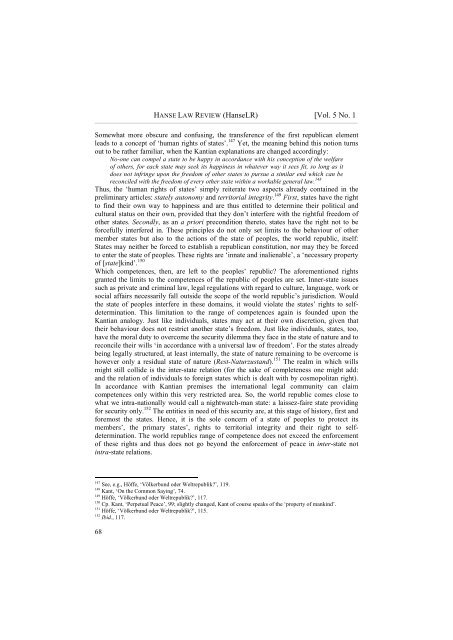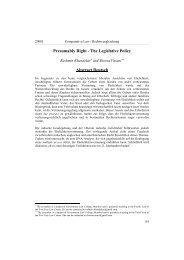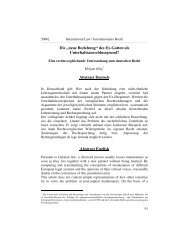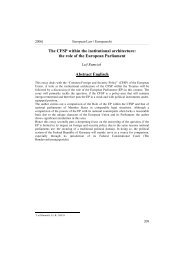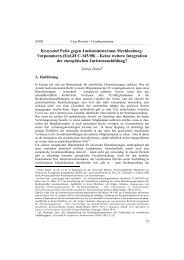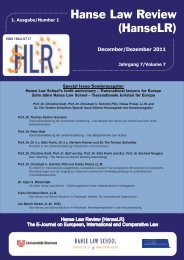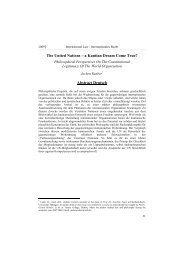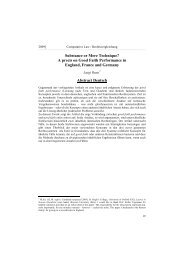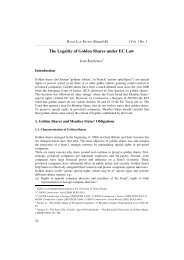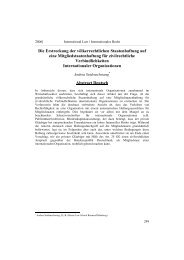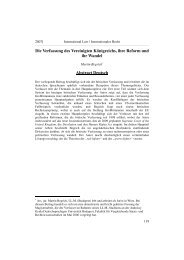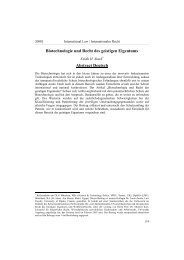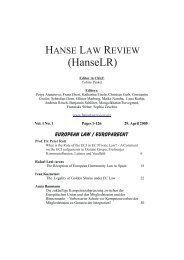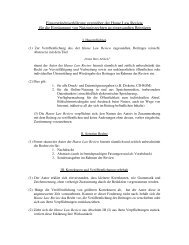The United Nations – a Kantian Dream Come True? - Hanse Law ...
The United Nations – a Kantian Dream Come True? - Hanse Law ...
The United Nations – a Kantian Dream Come True? - Hanse Law ...
You also want an ePaper? Increase the reach of your titles
YUMPU automatically turns print PDFs into web optimized ePapers that Google loves.
HANSE LAW REVIEW (<strong>Hanse</strong>LR) [Vol. 5 No. 1<br />
___________________________________________________________________________________________________________________________________________________<br />
Somewhat more obscure and confusing, the transference of the first republican element<br />
leads to a concept of ‘human rights of states’. 147 Yet, the meaning behind this notion turns<br />
out to be rather familiar, when the <strong>Kantian</strong> explanations are changed accordingly:<br />
No-one can compel a state to be happy in accordance with his conception of the welfare<br />
of others, for each state may seek its happiness in whatever way it sees fit, so long as it<br />
does not infringe upon the freedom of other states to pursue a similar end which can be<br />
reconciled with the freedom of every other state within a workable general law. 148<br />
Thus, the ‘human rights of states’ simply reiterate two aspects already contained in the<br />
preliminary articles: stately autonomy and territorial integrity. 149 First, states have the right<br />
to find their own way to happiness and are thus entitled to determine their political and<br />
cultural status on their own, provided that they don’t interfere with the rightful freedom of<br />
other states. Secondly, as an a priori precondition thereto, states have the right not to be<br />
forcefully interfered in. <strong>The</strong>se principles do not only set limits to the behaviour of other<br />
member states but also to the actions of the state of peoples, the world republic, itself:<br />
States may neither be forced to establish a republican constitution, nor may they be forced<br />
to enter the state of peoples. <strong>The</strong>se rights are ‘innate and inalienable’, a ‘necessary property<br />
of [state]kind’. 150<br />
Which competences, then, are left to the peoples’ republic? <strong>The</strong> aforementioned rights<br />
granted the limits to the competences of the republic of peoples are set. Inner-state issues<br />
such as private and criminal law, legal regulations with regard to culture, language, work or<br />
social affairs necessarily fall outside the scope of the world republic’s jurisdiction. Would<br />
the state of peoples interfere in these domains, it would violate the states’ rights to selfdetermination.<br />
This limitation to the range of competences again is founded upon the<br />
<strong>Kantian</strong> analogy. Just like individuals, states may act at their own discretion, given that<br />
their behaviour does not restrict another state’s freedom. Just like individuals, states, too,<br />
have the moral duty to overcome the security dilemma they face in the state of nature and to<br />
reconcile their wills ‘in accordance with a universal law of freedom’. For the states already<br />
being legally structured, at least internally, the state of nature remaining to be overcome is<br />
however only a residual state of nature (Rest-Naturzustand). 151 <strong>The</strong> realm in which wills<br />
might still collide is the inter-state relation (for the sake of completeness one might add:<br />
and the relation of individuals to foreign states which is dealt with by cosmopolitan right).<br />
In accordance with <strong>Kantian</strong> premises the international legal community can claim<br />
competences only within this very restricted area. So, the world republic comes close to<br />
what we intra-nationally would call a nightwatch-man state: a laissez-faire state providing<br />
for security only. 152 <strong>The</strong> entities in need of this security are, at this stage of history, first and<br />
foremost the states. Hence, it is the sole concern of a state of peoples to protect its<br />
members’, the primary states’, rights to territorial integrity and their right to selfdetermination.<br />
<strong>The</strong> world republics range of competence does not exceed the enforcement<br />
of these rights and thus does not go beyond the enforcement of peace in inter-state not<br />
intra-state relations.<br />
147 See, e.g., Höffe, ‘Völkerbund oder Weltrepublik?’, 119.<br />
148 Kant, ‘On the Common Saying’, 74.<br />
149 Höffe, ‘Völkerbund oder Weltrepublik?’, 117.<br />
150 Cp. Kant, ‘Perpetual Peace’, 99; slightly changed, Kant of course speaks of the ‘property of mankind’.<br />
151 Höffe, ‘Völkerbund oder Weltrepublik?’, 115.<br />
152 Ibid., 117.<br />
68


